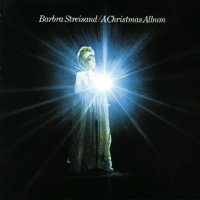
The Barbra Streisand Album is the debut album by American singer Barbra Streisand, released February 25, 1963, on Columbia Records, catalogue CL 2007 in mono and CS 8807 in stereo. It peaked at number 9 on the Billboard Top LPs, and has been certified a gold album by the RIAA. By 1966, the album had sold over one million copies worldwide.
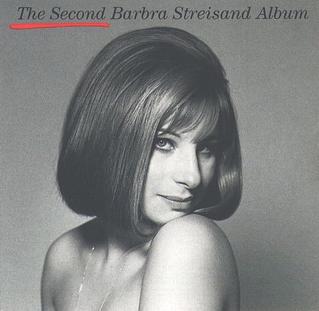
The Second Barbra Streisand Album is the title of Barbra Streisand's second solo studio album. It was released in August 1963, just six months after the release of her debut album, The Barbra Streisand Album, and was recorded in four days in June 1963.
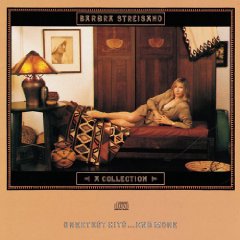
A Collection: Greatest Hits...and More is the fourth greatest hits album recorded by American vocalist Barbra Streisand. It was released on October 3, 1989 by Columbia Records. The compilation features ten songs from Streisand's career, dating from 1975 to 1988, plus two previously unreleased songs: "We're Not Makin' Love Anymore" was released as the album's lead single on September 14, 1989, and "Someone That I Used to Love" was distributed as the second and final one in 1989. Both singles charted on several record charts internationally.

The Essential Barbra Streisand is the fifth greatest hits album by American singer Barbra Streisand, released on January 29, 2002, by Columbia Records. The compilation features 38 songs from Streisand's catalog, in addition to two previously unreleased tracks. It includes material from 26 of the singer's albums and was described as a collection of, mainly, her pop songs. A reissued version of the compilation was distributed by Columbia and Legacy Recordings in 2008 and includes a bonus disc featuring nine additional songs from Streisand's discography.

Duets is a compilation album by American singer Barbra Streisand, released on November 26, 2002, by Columbia Records. The collection features nineteen duets from Streisand's career, including two newly recorded ones: "I Won't Be the One to Let Go" with Barry Manilow and "All I Know of Love" with Josh Groban. The Manilow duet was released as the album's lead single on November 4, 2002, as a streaming-only exclusive for AOL Music website members.
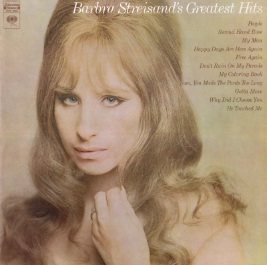
Barbra Streisand's Greatest Hits is the first greatest hits album recorded by American vocalist Barbra Streisand. It was released in January 1970, by Columbia Records. The record is a compilation consisting of 11 commercially successful singles from the singer's releases in the 1960s, with a majority of them being cover songs. The songs on Barbra Streisand's Greatest Hits originally appeared on one of the singer's eight previous albums and span in release from 1963 to 1968. It contains her most commercially successful tracks, including her first Billboard Hot 100 top ten single "People" and top 40 entry "Second Hand Rose". The album was distributed on compact disc in 1986 and rereleased under the title The Hits in 2006.

Memories is a compilation album by American singer Barbra Streisand, released in 1981. It is primarily a compilation of previously released material, but includes three newly recorded songs. First released on Columbia, it was re-released under the CBS imprint in 1981 with four additional tracks.

The Broadway Album is the twenty-fourth studio album by American singer Barbra Streisand, released by Columbia Records on November 4, 1985. Consisting mainly of classic show tunes, the album marked a major shift in Streisand's career. She had spent ten years appearing in musicals and singing standards on her albums in the 1960s. Beginning with the album Stoney End in 1971 and ending with the album Emotion in 1984, Streisand sang mostly rock, pop, folk, and disco-oriented songs for Columbia records. Noted Broadway composer Stephen Sondheim personally penned additional lyrics for the songs "Putting It Together" and "Send in the Clowns" on request of the singer. The album, originally released on the Columbia label and subsequently re-released by Columbia and Sony Records, was a critical and commercial success. First certified gold by the RIAA on January 13, 1986, it reached four times platinum on January 31, 1995.
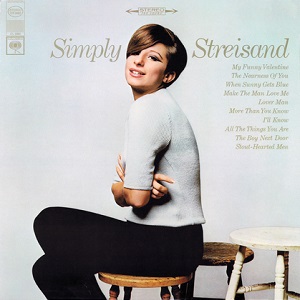
Simply Streisand (1967) is the ninth studio album released by American singer Barbra Streisand. The album was released simultaneously with A Christmas Album and was Streisand's first that failed to chart in the Top 10 of the Billboard 200 when it peaked at #12. Simply Streisand was recorded March 14, 15 and 20th, 1967. The album sold 250,000 in its first week in the market. It was certified Gold by RIAA on April 24, 2002.
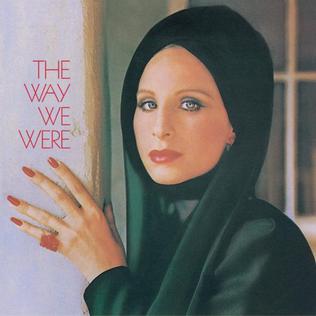
The Way We Were is the fifteenth studio album recorded by American singer Barbra Streisand. The album was released in January 1974, preceded by the commercial success of its lead single "The Way We Were" first released in September 1973.

Barbra Streisand's Greatest Hits Volume 2 is the second greatest hits album recorded by American vocalist Barbra Streisand. It was released on November 15, 1978 by Columbia Records. The album is a compilation consisting of ten commercially successful singles from the singer's releases in the 1970s, with a majority of them being cover songs. It also features a new version of "You Don't Bring Me Flowers", which was released as the collection's only single on October 7, 1978. Originating on Streisand's previous album, Songbird, the new rendition is a duet with Neil Diamond who had also recorded the song for his 1978 album of the same name. The idea for the duet originated from DJ Gary Guthrie who sold the idea to the record label for $5 million.
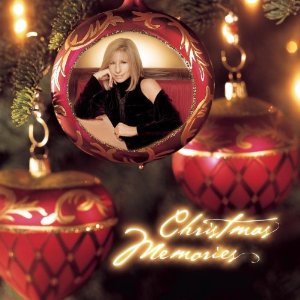
Christmas Memories is the second Christmas album and twenty-ninth studio release by American singer Barbra Streisand. It was released on October 30, 2001, by Columbia. Streisand recorded the album during July, August, and September 2001 in various recording studios throughout California and in North Vancouver. It was executive-produced by Streisand and Jay Landers, while William Ross and David Foster served as additional producers. The album contains several cover versions of various holiday songs. To promote Christmas Memories, Columbia Records released an advance sampler version of the album titled A Voice for All Seasons.

Barbra Streisand...and Other Musical Instruments is the fourteenth studio album by American singer Barbra Streisand. It was released on November 2, 1973, by Columbia Records. The album was made available following a 1973 live television special promoted to improve Streisand's image and sound. With world music as the primary genre, the album's instrumentation varies greatly; even items such as kitchen utensils were used to create melodies and beats. With a majority of the songs on the album being cover songs, Streisand also re-recorded various tracks that originated earlier in her career. Her manager, Martin Erlichman, was credited as the album's sole and executive producer.

Good Night, Dear Lord is the fourth album by American pop singer Johnny Mathis that was released by Columbia Records on March 3, 1958, and is the first of many projects undertaken over the course of his career that have a specific focus, which here happens to be religion. Several musical styles are covered, including spirituals, classical works, songs from the Jewish tradition, and 20th-century offerings.

Just for the Record... is a box set by American singer Barbra Streisand. It was released by Columbia Records on September 24, 1991. Just for the Record... includes a variety of performances throughout Streisand's career, including a song taken from her first studio recording session in 1955: a cover of "You'll Never Know". Other tracks were compiled from various live performances, TV specials, and previous albums from her back catalog.

The Classic Christmas Album is a compilation album of holiday music by American vocalist Barbra Streisand. It was initially released on September 27, 2013, through Legacy Recordings and Sony Music Entertainment, with a revised version released digitally a few months later and physically on October 7, 2014. The collection was produced by Didier C. Deutsch, Jeffrey James, and Tim Sturges. All of the material on the record is taken from Streisand's previous two Christmas albums, A Christmas Album (1967) and Christmas Memories (2001).

Partners is the thirty-fourth studio album by American singer Barbra Streisand, released on September 16, 2014, by Columbia Records. The album features Streisand singing duets with an all-male lineup including Stevie Wonder, Michael Bublé, Billy Joel, John Legend, John Mayer, Andrea Bocelli, Lionel Richie, and from an earlier recording, Elvis Presley. The collection also features Streisand's first studio-recorded duet with her now 47-year-old son, Jason Gould. The album release was promoted on The Tonight Show, where Streisand was the evening's sole guest and sang a medley with host Jimmy Fallon.

A Star Is Born is the soundtrack album to the 1976 musical film of the same name, performed by its stars Barbra Streisand and Kris Kristofferson. The album was very successful, holding the number-one spot on the US Billboard 200 chart for six weeks and eventually was certified 4× Platinum by the RIAA for more than four million units shipped and has sold a total of eight million copies worldwide.

The Way We Were: Original Soundtrack Recording is the soundtrack album to the film of the same title by American singer Barbra Streisand. It was released by Columbia Records on January 30, 1974. The soundtrack comprises twelve songs, mostly written by Marvin Hamlisch, three of which are different versions of "The Way We Were". The album was mostly produced by Fred Salem, with the exception of the title track which was produced by Marty Paich. Hamlisch and Salem collaborated to create five new songs for the soundtrack, while the remaining ones are cover songs.

Funny Lady is the soundtrack album of the 1975 musical film of the same title, starring Barbra Streisand. Released by Arista Records on March 15, 1975, arranged, conducted, and coordinated by Peter Matz, the album's fifteen tracks are performed by Streisand, James Caan, and Ben Vereen. A sequel to the 1968 musical comedy-drama Funny Girl, the songs extend the semi-biographical account of the life of American performer Fanny Brice. Funny Lady also included songs written by Brice's third husband Billy Rose. New music by Kander and Ebb included "How Lucky Can You Get", the album's only single, released in April 1975.
